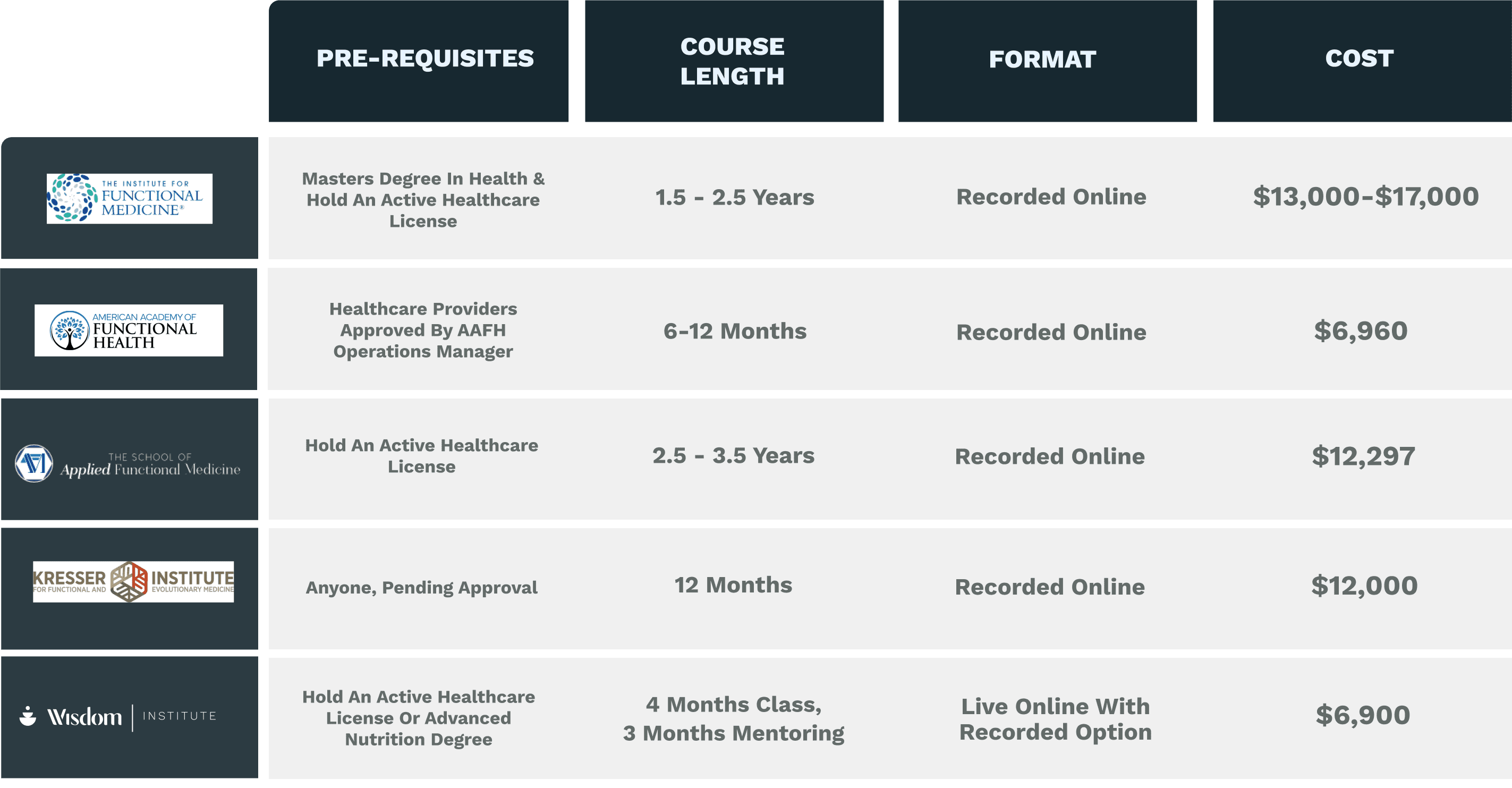Trying to understand the landscape of functional medicine certifications is very confusing. It becomes increasingly complicated if you are not a doctor, trying to navigate what you can practice, and what you can call yourself as your professional title.
This article will hopefully cover all common questions that come up in the process of deciding where to get your functional medicine certification. Including:
- What titles can I take with functional medicine certifications? How does that change if I’m a nurse, NP, or PA vs. a doctor?
- How is the Institute of Functional Medicine certification different from other programs?
- What programs can I take if I’m a nutritionist and don’t have a master’s degree or healthcare license?
- How much does certification cost?
- How long is the certification process?
- How does the Functional Medicine Certification change my scope of practice?
What is a Functional Medicine Certification, and why should I get one?
Functional medicine certification is a specialized type of certification for healthcare and wellness professionals who want advanced training in treating the root causes of chronic diseases and focuses on treating the whole person, rather than just their symptoms. Functional medicine was invented to address the blind-spot in conventional medicine in truly treating chronic disease, rather than just treating symptoms.
A functional medicine certification is typically earned by healthcare professionals who have completed additional education and training in functional medicine. This may include medical doctors, chiropractors, naturopathic doctors, nurse practitioners, nutritionists, and other healthcare providers.
The certification process for functional medicine can vary depending on the organization offering the certification. Generally, it involves completing an accredited educational program in functional medicine and in some cases, an exam.
Obtaining a functional medicine certification can enhance a healthcare provider’s ability to offer personalized care to patients, especially those with complex chronic conditions. It may also provide a competitive edge in the healthcare industry and potentially increase earning potential.
According to Rupa Health, the average functional medicine doctor makes $460 / hour.
Medical License vs. Professional Certifications
Currently, functional medicine is unregulated, which means you do not need a certification to practice functional medicine. If you’re seeking training, that means the certification you receive is far less important than the quality of education.
Functional Medicine Certifications, including the Institute of Functional Medicine certification, are professional certifications and differ from a License.
A medical license and a professional certification are both important credentials for healthcare professionals, but they differ in several ways.
Medical License:
A license is a legal document that allows a healthcare professional to practice under a specified scope of work in a particular state. A state board or licensing authority issues it after the individual has completed the necessary education and training and has passed the required examinations. A license is typically required for physicians, nurses, dentists, massage therapists, acupuncturists, and other healthcare professionals who provide direct patient care.
Professional Certification:
On the other hand, a professional certification is a voluntary credential that demonstrates a healthcare professional’s knowledge, skills, and expertise in a particular area of practice. Professional certification is often offered by professional organizations and is not required by law to practice in a particular field. Examples of professional certifications in healthcare include health coach certifications, nutritionist certifications, and yoga teacher certifications. While it’s not a license, functional medicine certifications:
1) Provide training and education to expand professional knowledge and skills.
2) Signals to the public and other health care professionals that you have completed training in this specialty.
Currently, there is no licensure in functional medicine, but a number of professional organizations and educational institutions are meeting the rapidly expanding interest in functional medicine. In order to become a certified functional medicine practitioner, it is important to choose the right program that fits your professional needs.
Do I need To Study at the Institute of Functional Medicine to be a functional medicine practitioner?
Because a number of organizations offer the same certification title, it is important to understand the variations of price, length, content and style of each program.
IFM is one of the oldest organizations, created by medical doctors who were adopting and exploring the paradigms of holistic medicine, nutritional medicine, naturopathic medicine, and exploring new ways to work with the body’s innate capacity to heal. But as demand has increased, other health and medical professionals needed the professional support that more closely matched their needs in training, professional specialty, style of training, and price.
These include:
- Institute of Functional Medicine
- The American Academy of Functional Health
- Kresser Institute
- Kalish Institute
You should make your decision about where you do your training the same way you choose a college. You should strongly consider:
- The cost.
- The program duration.
- The training format: live vs. recorded content.
- Instructor quality: learning from experienced clinical experts.
- The educational content and how well it fits specifically what you want to do.
- The overall feel of the program.
If you are considering signing up for the IFM functional medicine training, understand that you should be doing it based on your assessment of the quality of the program and what you will learn, not because it will give you a new scope of work, or unique title.

Functional Medicine Training for Nurses, Nurse Practitioners, and other medical professionals who aren’t doctors.
If you are a doctor, the process of becoming certified to practice functional medicine is pretty straightforward. You go through a qualified functional medicine certification program and you can professionally refer to yourself as a Functional Medicine Doctor.
It’s equally as simple for other medical professionals, with a few nuances. Overall, it’s important to understand that professional certifications can influence your professional title, but do not change your legal scope of practice.
The terminology in the functional medicine space is starting to be a little bit confusing, as nurses and nurse practitioners can legally refer to themselves as “Functional Medicine Practitioners” the same as doctors. Typically when you see someone referring to themselves as a Functional Medicine Practitioner, they are not a doctor. Most doctors will take the title “Functional Medicine Doctor.”
For example, RNs are generally not licensed to prescribe medication. Even if you learn about some useful medications in functional medicine training, that does not allow you to begin prescribing medications.
Another example is nutritionists and supplementation. If you live in a state that is particularly strict about giving diet and supplementation advice as a health coach or nutritionist, a professional training does not allow you to circumnavigate those laws. You are still bound to the scope of practice outlined in your state.
Your functional medicine certification allows you to refer to yourself as a Certified Functional Medicine Practitioner and integrate the tools and strategies of functional medicine within your current scope of work.
However, these laws are changing and being updated very fast, and they are also difficult to enforce. Due to the huge shortage of healthcare workers in the US, it seems likely that many of these laws will change.
Who the Wisdom Institute Functional Medicine Training Is For:
Because functional medicine is unregulated, what’s most important about the training you take is the education quality, not the certification. You’ll receive the same title and professional credentials no matter what program you take, and because that does not change your scope, it is somewhat immaterial outside of professional recognition.
The functional medicine training at the Wisdom Institute is a fast-track educational track that cuts out academic fluff and focuses on real-world clinical application. Over the course of 7 months, you’ll learn in live Zoom group settings from senior clinicians actively in the practice.
Summary:
- Functional medicine is a rapidly growing segment in health, wellness, and medical practice. There is no licensure specific to the title of Functional Medicine Doctor or Practitioner, but there are professional certifications.
- Functional medicine training does not change the scope of practice set out in your licensure. If you don’t have a medical license, the functional medicine training does not grant you a license.
- Anyone, including health coaches and nutritionists, can receive education in functional medicine, so long as you meet the entry requirements of the program you are applying to.
- You have many options for where you should receive your functional medicine training. You should strongly consider cost, the program duration, educational content and how well it fits specifically what you want to do.





